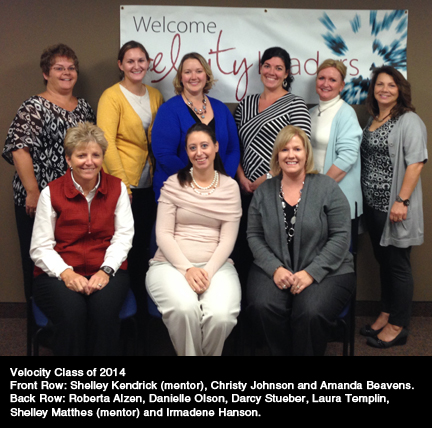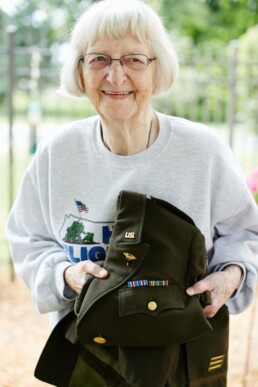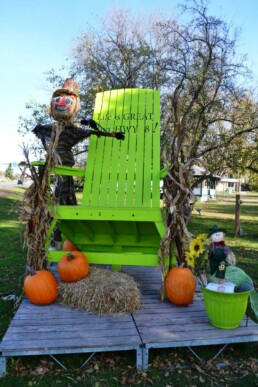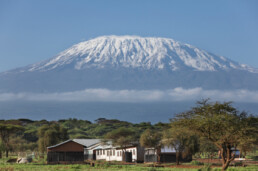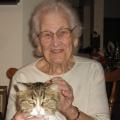Honoring Two Greatest Generation Vets: 70 Years Later
James and Virginia, both in their early 20s, were in the U.S. Army, two young Americans bonded by a common cause and fighting against a common enemy.
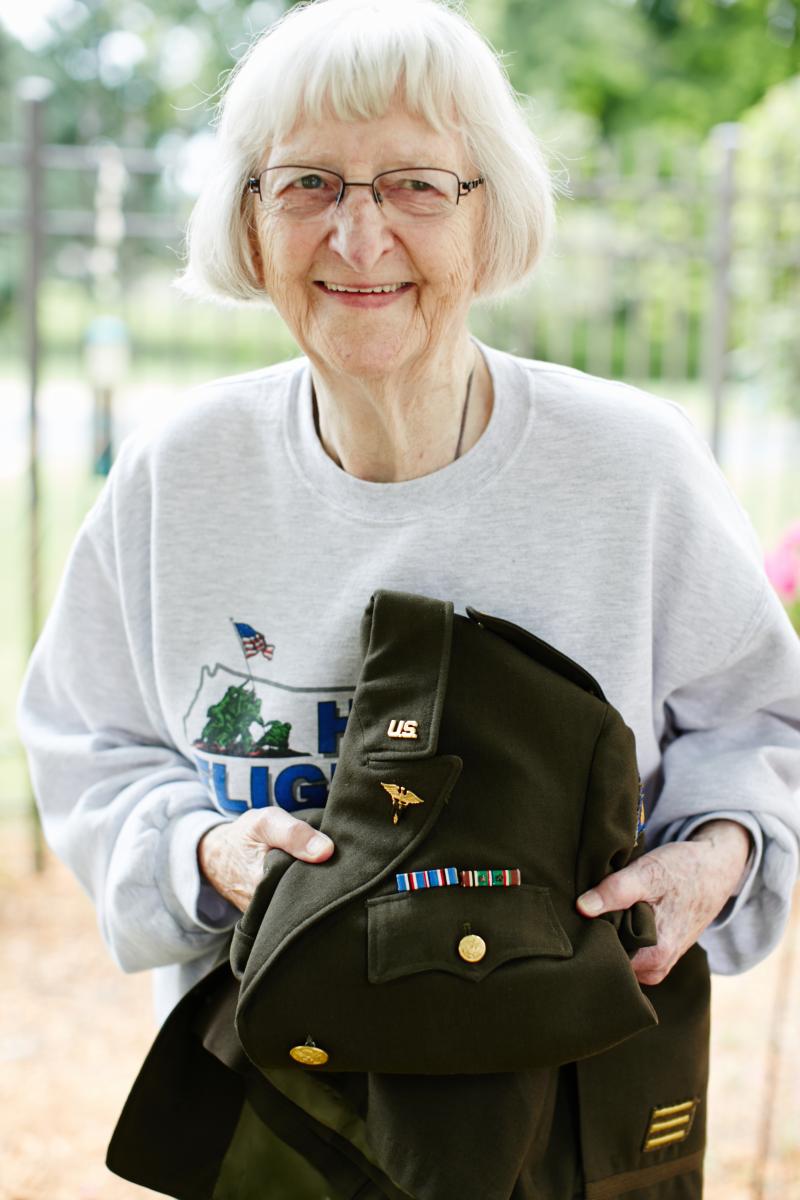 They were two of the 16 million who served in World War II. They did not know each other then. James was in heavy combat, and Virginia was not far behind the lines as an Army nurse, caring for wounded soldiers.
They were two of the 16 million who served in World War II. They did not know each other then. James was in heavy combat, and Virginia was not far behind the lines as an Army nurse, caring for wounded soldiers.
Their paths would cross one day, but not until 70 years later. They are now both living at Ecumen Pathstone Living in Mankato. James is 95. Virginia is 91.
They are proud of their service. But, like so many members of the Greatest Generation, they are also modest.
James changes the subject when he’s asked about his war experience.
And Virginia simply says, “This was a very important part of my life. I can’t say enough about how great all the GIs were.”
Virginia met an infantry officer in Europe who she would later marry back in the States. She continued in nursing, and he became a college president.
James and his wife have lived at Ecumen Pathstone Living for three years now.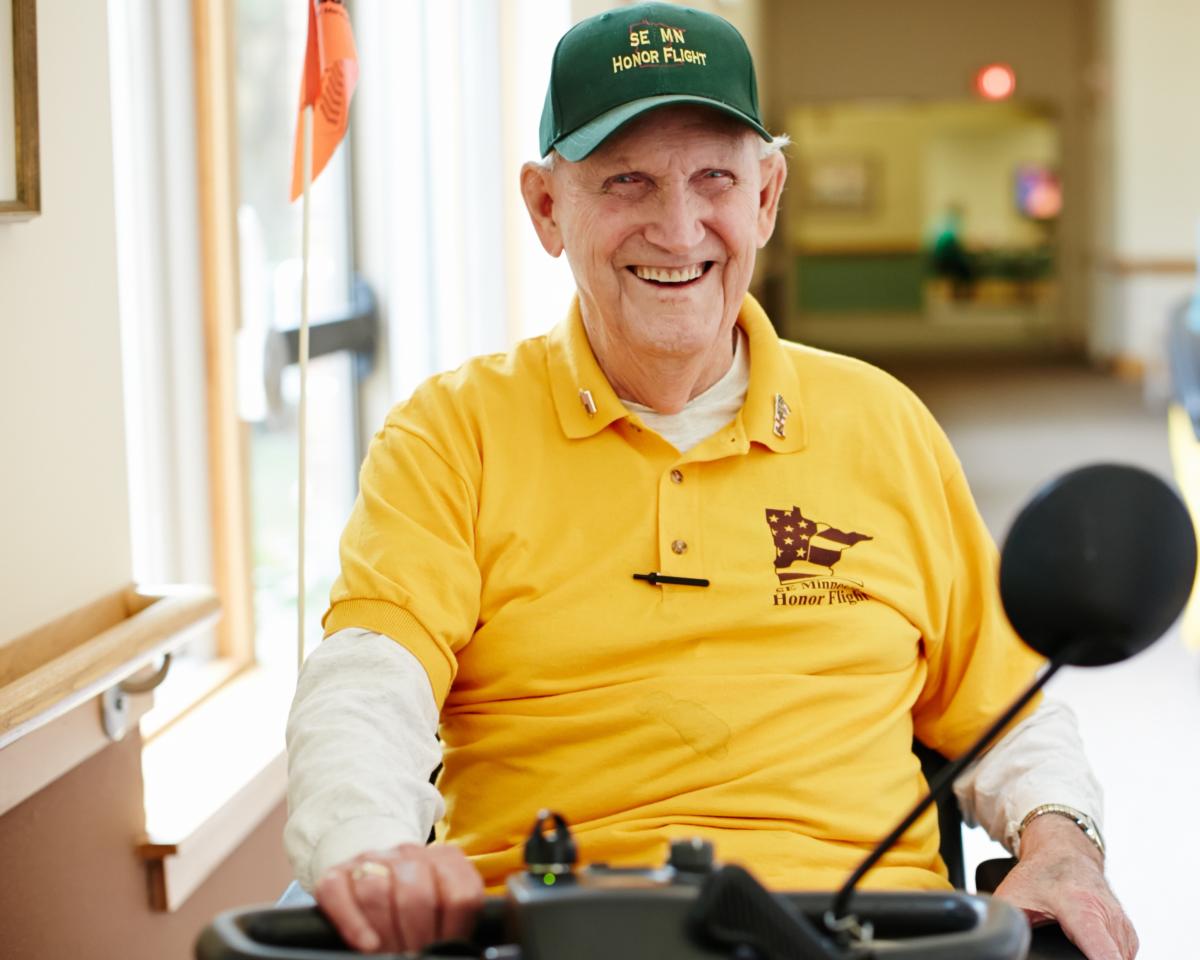
Both Virginia and James appreciated that they were guests on Honor Flights in 2011. Virginia flew out from Kansas City and James from Rochester, Minn., on the whirlwind one-day flight to Washington, D.C. to visit the World War II War Memorial.
While on the flight, they received “mail call” which included letters from children (classrooms wrote letters), also some family, as well as a card from staff at Pathstone Living. When they landed, they were escorted to the WWII memorial by police cars. Then they were greeted by supporters who held posters and cheered when they returned.
On Veterans Day, Ecumen communities will be honoring veterans like Virginia and James and all our veterans who have served. We cannot honor them enough.
Star Tribune Highlights Ecumen as "Nonprofit To Know"
Ecumen is highlighted as one of the “Nonprofits To Know” in the November 6, 2013, Star Tribune “Giving Back” special section.
The Star Tribune calls attention to “Nonprofits To Know,” a video series produced by Minnesota Philanthropy Partners featuring nonprofits doing important work.
The Ecumen video focuses on the Little Treasures Childcare and Family Center in Duluth, which serves at-risk children. Ecumen teamed up with Little Treasures in 2011 to create an inter-generational program to foster the healthy development of children and increase the quality of life of older adults. At the time, Little Treasures needed a permanent home, and Ecumen had some unfinished extra space at Ecumen Lakeshore. The space was converted into the daycare center with donations from local civic organizations, individuals and foundations. Ecumen Lakeshore residents regularly volunteer there as “grandfriends” to babies and toddlers.
Ecumen CEO Kathryn Roberts is interviewed in the video, which can see here.
Bridging the Gap in a 50-Year Friendship at Esprit Whispering Ridge
By Kim Hall Grier, Senior Living Consultant, Esprit Whispering Ridge
Mary Ellen and Marie were Bridge partners and devoted friends for more than 50 years. Their husbands were friends and had introduced them one day at the Happy Hollow Country Club in Omaha.
“We just hit it off,” Marie said. “We had so much in common. We were like two peas in a pod.”
Then time and circumstances separated them. They lost touch in 2009.
In June of this year, Mary Ellen moved to Esprit Whispering Ridge, an Ecumen-managed community in Omaha. She quickly declared her love of Bridge. As luck would have it, another woman, Jerrie, moved to Esprit the same day and also loved Bridge. A makeshift game came together, with staff members filling empty seats. But what they really needed was a regular fourth.
One day, a woman came to look at Esprit Whispering Ridge as a possible residence for her mother, Marie. A senior living consultant was showing Marie’s daughter around the assisted living facility. The daughter mentioned that her mom just adores playing Bridge. “That’s great,” the consultant said. “Let me show you the Bridge game going on over here. They really need a fourth.”
Suddenly the daughter’s eyes lit up. “Oh, my…that’s Mary Ellen! That’s my mom’s best friend.”
In October, Marie also moved to Esprit, joined the Bridge game, and now plays every single day with her best friend. And after Bridge, they enjoy reminiscing about the good old days at Happy Hollow.
They remember how Marie preferred tennis, and Mary Ellen favored golf, and how that was a good thing-- because they were always playing Bridge together. Just like now….
Paying It Forward on Highway 8
By the roadside on Highway 8 coming into Chisago City a green giant of a chair entices passers-by to come over, sit down and be swallowed up.
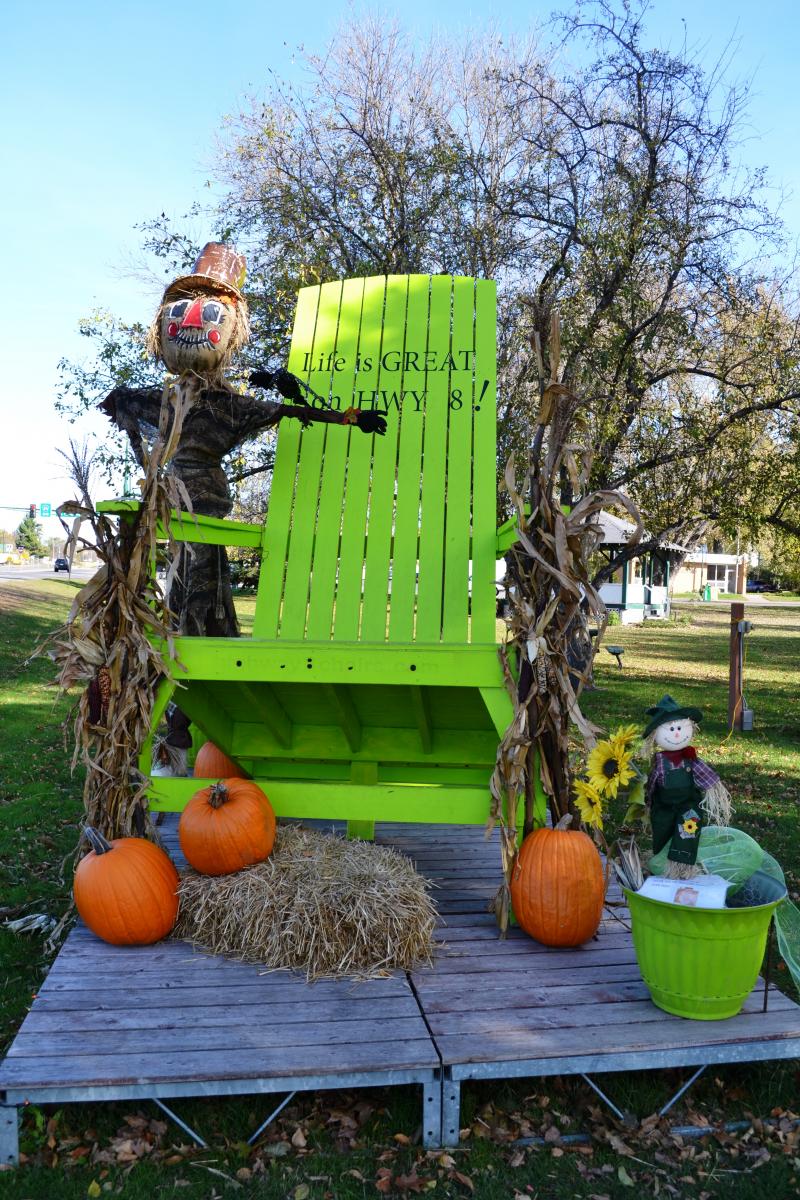 It’s a people magnet—a perfect prop for a hammy photo to post on Facebook, which hundreds of people have done. On the back of the chair is the slogan: “Life Is Great on Highway 8”--the theme of a program born from necessity and nurtured by an unbounded community spirit that keeps pulling people together in an ongoing saga of paying good deeds forward.
It’s a people magnet—a perfect prop for a hammy photo to post on Facebook, which hundreds of people have done. On the back of the chair is the slogan: “Life Is Great on Highway 8”--the theme of a program born from necessity and nurtured by an unbounded community spirit that keeps pulling people together in an ongoing saga of paying good deeds forward.
The Big Chair has roots extending throughout the community. One place is about a half mile away, at Ecumen Parmly LifePointes in Chisago City. There, in the Vitalize! Centre, is a fully outfitted woodshop, where every tool has been donated. Often people moving out of their homes into Ecumen Parmly will donate those no-longer-needed power tools and band saws and drill presses. And from these donations an exceptionally well-equipped woodshop has evolved.
A regular group from all around the area comes to the woodshop and uses these donated tools to make all sorts of wooden wonders, which they in turn donate, never seeming to have trouble finding a good cause.
During the summer of 2012 the entire Chisago Lakes area was having a bad time. Road construction was so disruptive that it scared off the vital tourist traffic to the local businesses all along the Highway 8 Corridor, including Chisago City, Lindstrom, Center City, Shafer and Taylors Falls. Some businesses were so hard-hit they had to close.
The Chisago Lakes Area Community Foundation didn’t want 2013 to be a replay of that awful summer of 2012. So they imported a clever idea from out East designed to draw tourists back. The idea was to have local businesses sponsor the construction of Adirondack-like chairs, have the chairs beautifully painted by local artists and sold at a silent auction, with proceeds going to the Foundation, which would in turn use the money for further community building. The businesses would pay $200 to put a sponsored chair in their store, which would cover the cost of materials. The catch was that you had to come into the store to place a bid on its chair.
There was general agreement that the idea had legs, but who would make the chairs? The Foundation committee was having this discussion when Roger Trivette, who kind of looks (and acts) like Santa Claus, raised his hand. How about this: he would design the chairs and get his buddies over at the Ecumen Parmly woodshop to help make and assemble them. 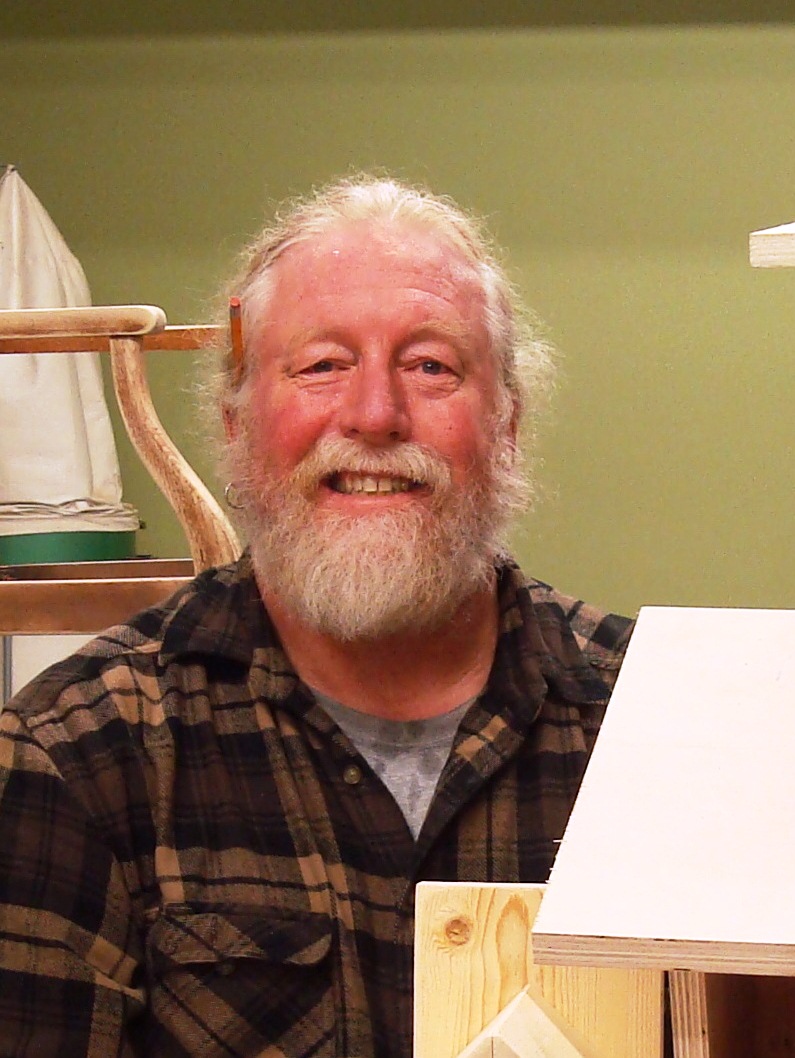
So the woodshop volunteers made most of the chairs, the local artists painted them in ways that charmed and captivated, people came into the stores to see all the chairs and make their bids, and by the time this was all over, the Foundation raised more than $20,000 on 37 chairs. The oversized chair by the road in Chisago City is a monument to this program, and the other cities along the corridor each have a “Big Chair” too. Facebook is full of pictures of happy kids climbing on the giant chairs--giving their testimony to life being great on Highway 8.
Of course, the program was never really about the money. It was about attracting people back to local stores. So the Foundation invested the money and is using the interest to make ongoing grants back to the community to continue the good work.
And the story keeps going….
Remember the folks over at Ecumen Parmly’s Vitalize! Centre who made most of the chairs? They applied for a $500 grant from the Foundation. And got it. With the grant money, the woodshop crew went back to work on community projects. 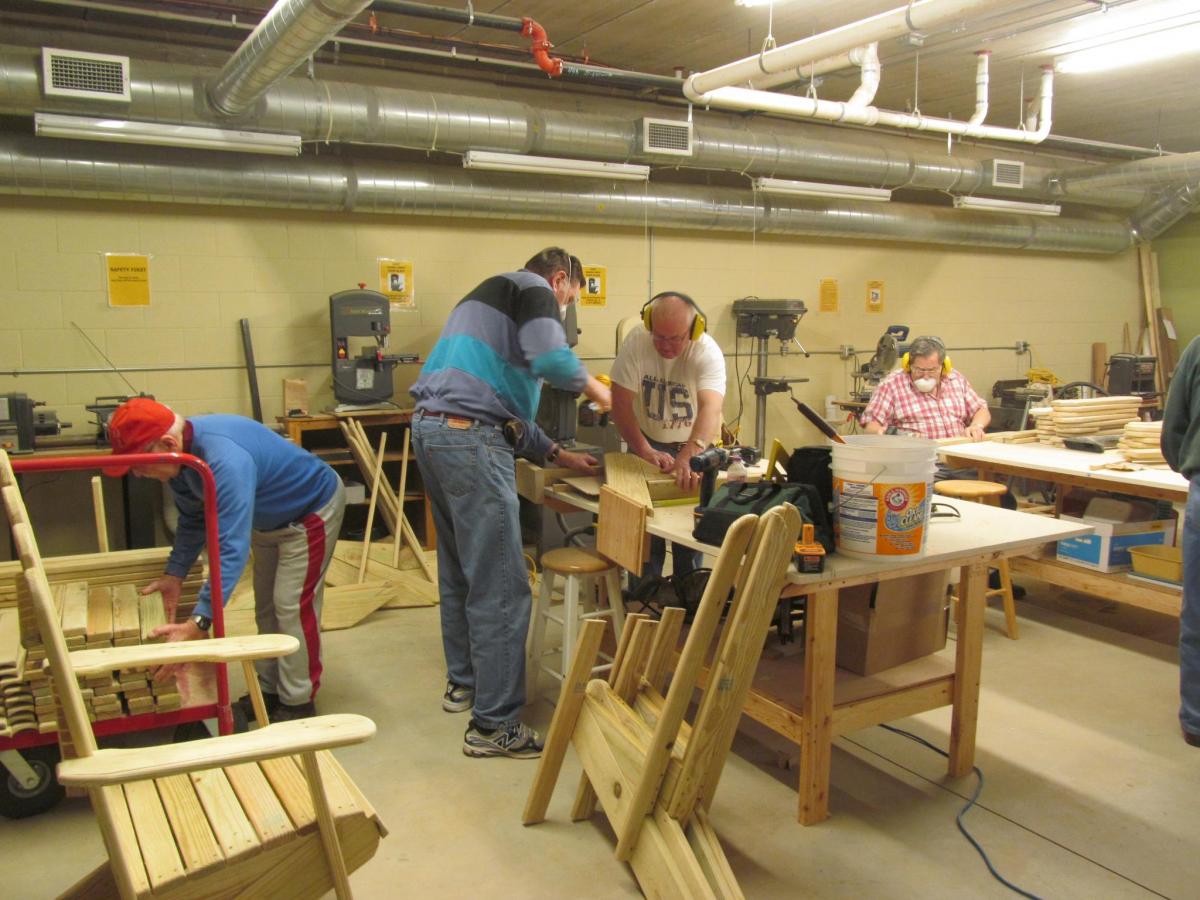
The chairs project was just part of the woodshop group’s routine of giving their time and talents to the community. Two years ago, they made birdhouses for the Birdhouse Ball, an event held to raise money for the material to make bunk beds at Camp Ojiketa. With the proceeds from the Birdhouse Ball, the woodshop went back to work making bunk beds for the camp. Then somebody had this idea to take ugly old chairs that nobody wanted, and refurbish them, and sell them. So the woodshop went back to work again. They’ve worked on projects for tenants of Parmly LifePointes, repaired furniture for the nursing home, worked on projects for Camp Triumph, and coach one another on each project they have built. And come Monday, they will gather in the woodshop at the Vitalize! Centre, and get back to work, yet again.
And a similar story keeps going all over the community, with people pitching in to pay more good deeds forward—making sure life stays great on Highway 8.
--
[To see more chairs go here to the Foundation’s Highway 8 website. And if you would like to become involved in community programs, donate, or just learn more, go to www.parmly.org or call the Parmly Vitalize! Center at 651-257-7957.]
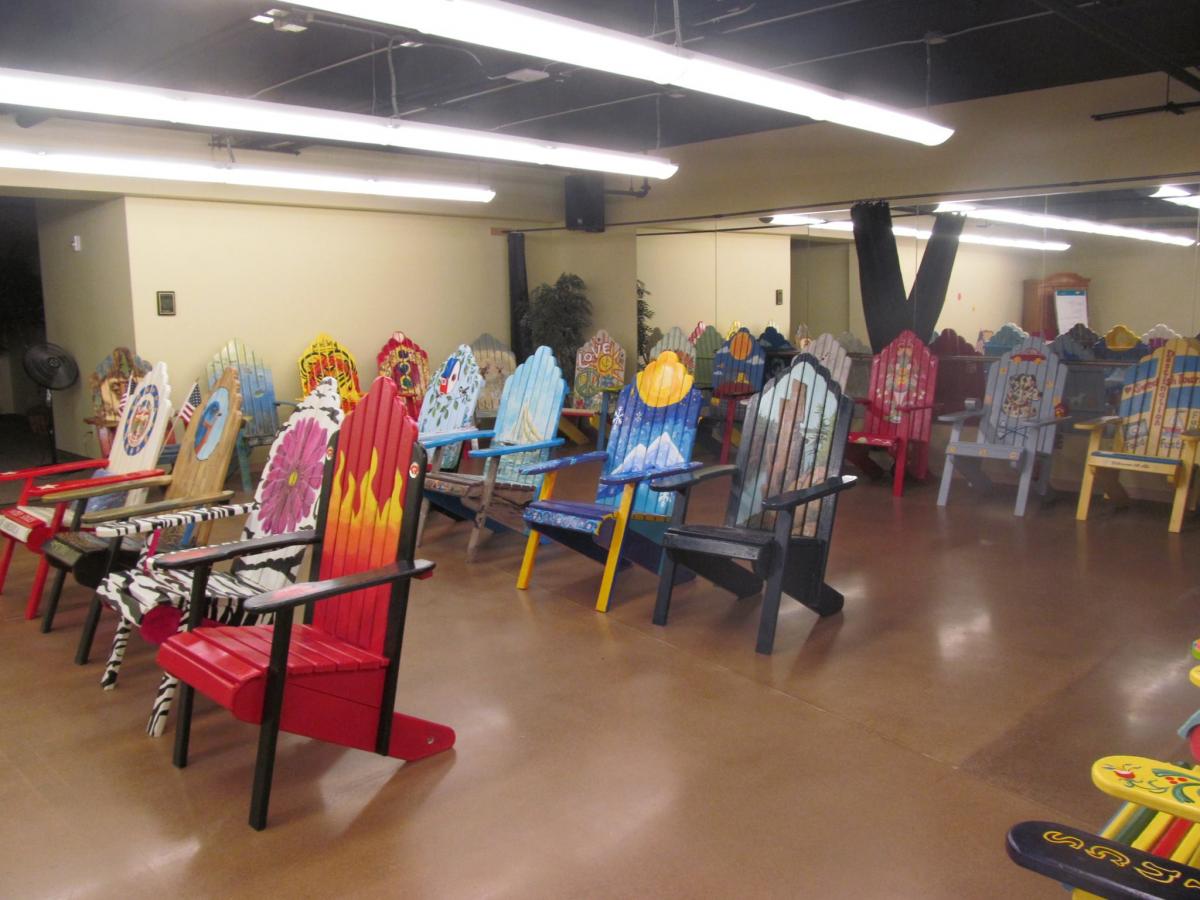
He Was a Most Unforgettable Man-- by Ecumen Blogger Jim Klobuchar
A lady in the state of Georgia writes to me two or three times a year, asking after my health and speculating on the depth of the expected snowdrifts in Minnesota in the winter.
This is mostly a ruse. Our talk invariably turns to Africa. What she wants is to turn back the calendar nearly 25 years to a dicey trek we and four others made through the great African Rift in the heart of the lion country in Tanzania.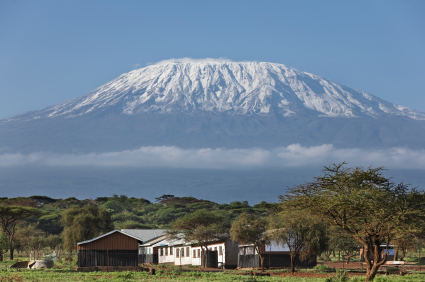
But fundamentally she wants to remember David Simonson. I can’t blame her. So do I. David Simonson is impossible to forget. He was a Lutheran preacher built like a football tackle—although he actually played fullback for the Concordia College team in Moorhead, Minnesota, which did him no good in Africa because they play rugby there. So the young missionary played rugby on his day off. And some days in his little church he preached his sermons to the Maasai warriors leaning on a crutch because he got banged up the day before in a scrum.
He arrived in Africa with his wife and infant children in the middle of the Mau Mau revolution in the 1960s. His commitment was to bring, to the not easily convinced Maasai, his God and what medicine and guidance he could manage. Over the years he overcame their skepticism by the thousands. Yet he never measured his service by numbers of conversions. Their trust in him was more important. There was the day early in his ministry when he was called by his superiors to fill in for the veteran missionary hundreds of miles to the south who had to be flown near death to a hospital in Arusha. Simonson arrived in a dusty Land Rover, young, a stranger to the resident Maasai and willing to get acquainted.
On his second day, two of the tribal elders came to his cabin while he was cooking his dinner. They noticed he had a shotgun in the Land Rover. They told him in their mixed Maasai and Swahili language that a lion had been threatening their compound. It had killed some of their cows. They had spears. But they were afraid for their children and worried that their spears could not stop the lion that night. From experience they knew the lion would return. They asked the young preacher if he could help.
Seeking the trust of troubled natives, the young preacher was not going to tell them “no.” He had hunted pheasant and deer in Minnesota and the Dakotas. A rogue lion was something else. Simonson drove his Rover to the edge of the high savannah near the settlement. With night falling he heard the lion advancing, and then saw him emerge hugely from the high grass. He turned on the Rover’s headlights and dismounted, trembling but ready. The lion crouched to leap. Simonson fired once, twice. The lion fell dead.
And the next morning in the village there were more church-going Maasai.
But Simonson never saw it in that light. In the years ahead he became a friend and tutor, and somehow a kind of co-warrior, a brother, with the Maasai in their search for something better in life.
They had been nomadic and their treatment of their women had been uniformly wretched and aboriginal. With his wife, Eunice, a nurse who became a revered mother figure to thousands of Maasai women, Simonson became a man of trust and ultimate respect among the Maasai elders. Years later the Maasai gave them the ultimate badge of respect from these hitherto uncompromising warriors—a plot of Maasai land for their new home, high above the Tanzanian plain, within sight of their revered mountain, Kilimanjaro.
Dave Simonson died two years ago in the land he’d come to love. Hundreds of the Maasa walked from miles away to attend his service.
He was not an easy man in an argument. His quarrels with his superiors over the distribution of funds once landed him in exile from the major city of Arusha to the far northern village of Lolionda. Simonson didn’t waste a lot of time brooding. He compensated for his lack of transportation by striking up a friendship with the local Sikhs, a group well-schooled in the versatility of money. His new friends found a second-hand Land Rover that Simonson—no mean mechanic—made road-ready in two weeks.
And so my friend in Georgia, Donna, wanted once more to remember the walk she and five others of us made with Dave Simonson in 1988. Over his more than 50 years of service in Tanzania, Simonson had built thousands of one-room school houses for the Maasai children with money raised primarily by his fundraising appeals in Minnesota, Colorado and other states. He was relentless. Until he arrived, the Maasai kids had to read their lessons under rocks and in their smoke-filled bomas. His final stewardship was the construction of a modern middle school for Maasai girls, many of whom today—lifted from their solitary role of child-bearing in a polygamous household—are teaching and working other meaningful jobs, some of them already advancing professionally.
So he had invited us in 1988 to join him in his walk. He organized it once every three years to dramatize the need for additional funds. I was invited not only as a friend but as a daily newspaper columnist, who predictably could find enough there for a daily story, or three or four. The African Rift is a great 4,000-mile cleavage in the earth running from what is now Syria to South Africa. Donna was invited as a longtime friend of Africa. Then one night the six of us sat beneath a conflagration of stars in the Africa sky, listening to a CD player and the great chords of Rachmaninoff’s Second Piano Concerto. The memory still lifts me back to Africa each time I hear it.
But the next day the Reverend roused us at 5:30 a.m. for breakfast, then a moment of grace, and we were off into the high savannah. Our head lamps speared the darkness. An hour into it we heard the roar of a lion 300 yards away. A lion that close sounds like a freight train rolling through an echo chamber. It is a sound that cuts through your bones and spins your stomach. I have heard 10-ton boulders falling from a mountain wall overhead, and I’ve heard lightning bolts splitting trees in the Minnesota wilderness. I will take the freight trains and lightning bolts before the sound of a roaring lion in the African bush. The reverend ahead of us, not averse to a little showmanship, was wearing his wide and customary Australian hat with two revolvers on his hips. “Reverend,” I said, “do you really think those revolvers will stop a lion?” The reverend considered this without breaking stride. “Probably not,” he said. “So,” I said, “what then?” Without breaking stride, Simsonson said, “I’ve always believed that the Lord will take care of me.” I considered this solution carefully. “Great,” I said, “What about us?”
The reverend turned benignly. “It’s a slam dunk,” he said. “If the lion was serious, we wouldn’t have heard him.”
“Donna,” I told my friend a few days ago, “I can still hear the lion. He may have been lucky. The jungle telegraph probably told him this was one guy you don’t mess with.”
Ecumen Home Office Celebrates Lights of Honor
Ecumen Home Office staff and Ecumen Board of Trustees members celebrated Lights of Honor October 23, 2013.
The Rev. Kris Linner, a Lutheran pastor and Ecumen board member, gave the invocation and led the group in a liturgy of celebration. The celebration then moved outside where biodegradable balloons were released in remembrance of lost loved ones. Then celebrants enjoyed cupcakes and cider in the Shoreview Home Office lobby where the Honor Lights were displayed, along with pictures of loved ones.
Lights of Honor is a yearly fundraising event held at Ecumen sites across the state. Participants sponsor Honor Lights to honor, remember and celebrate loved ones, friends and caregivers. Proceeds go directly to local Ecumen communities.
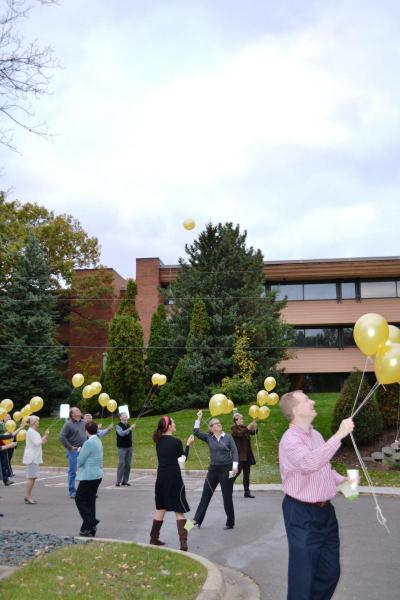
Balloon release in memory of lost loved ones
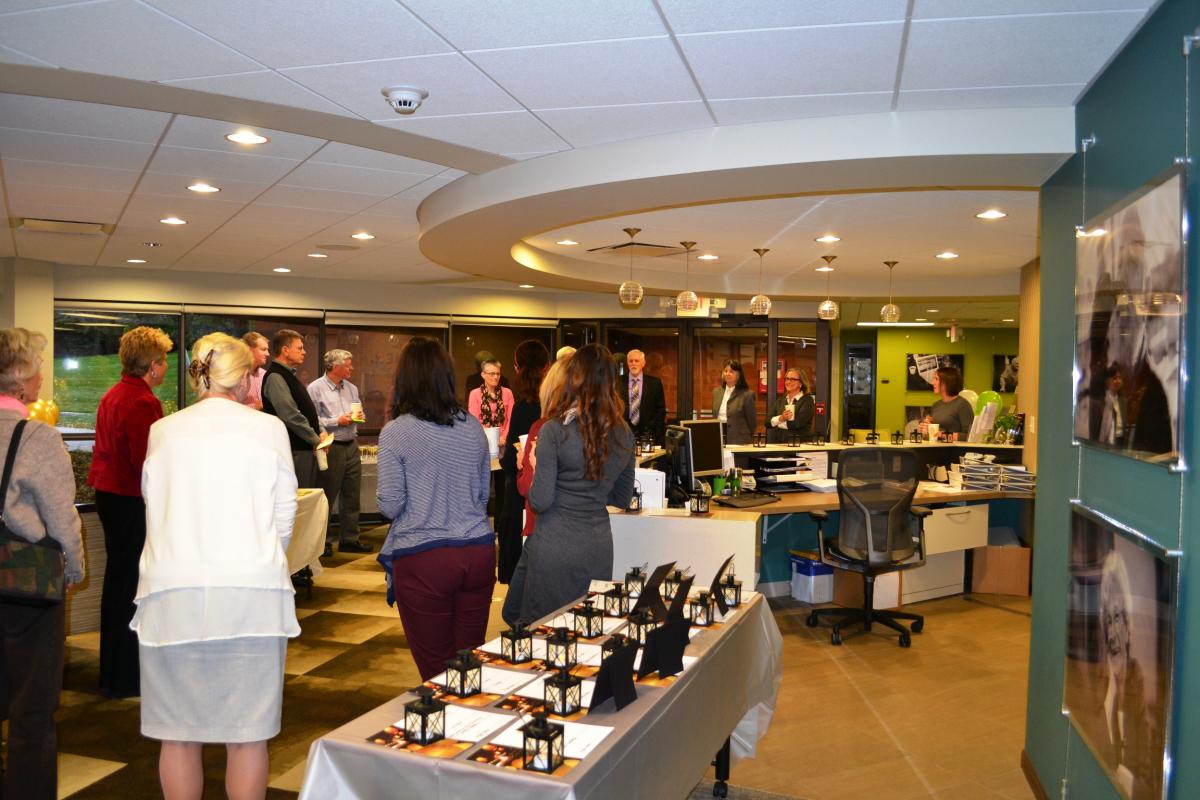
Lights of Honor Ceremony, Ecumen Home Office
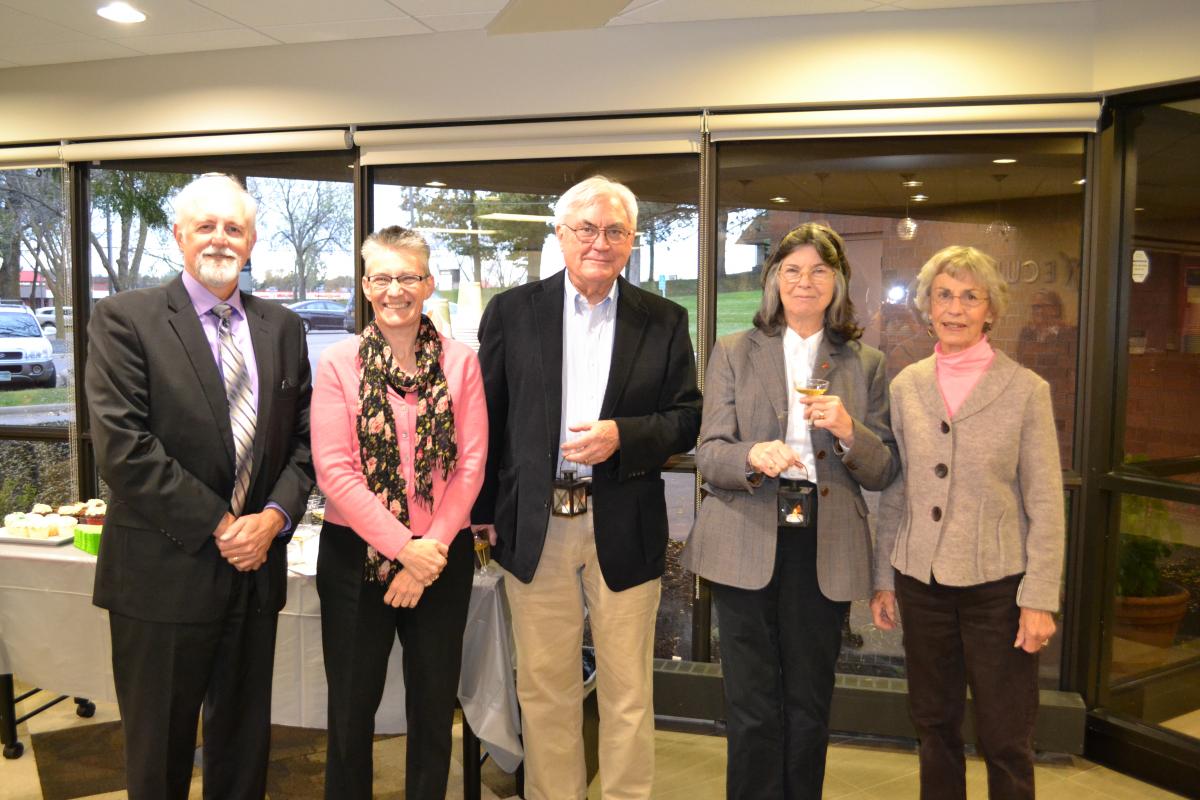
Ecumen Trustees Bob Karrick, Kris Linner, Dick Olson and wife Martha, and Anne Simpson
Ecumen Scenic Shores in Two Harbors Awarded VA Contract For Nursing Care
Veterans in the Two Harbors area will now be eligible to receive skilled nursing care at Ecumen Scenic Shores reimbursed by the U.S. Department of Veterans Affairs (VA). Previously, Duluth was the closest site for veterans to receive VA-reimbursed skilled nursing care.
“We are honored to better serve the Veterans of our community who have sacrificed so much,” said Blaine Gamst, executive director at Ecumen Scenic Shores.
Also, under the new VA contract, which was effective October 15, 2013, any Veteran needing hospice services will be 100% covered.
Ecumen Scenic Shores is a non-profit assisted living and senior care center community in Two Harbors, Minn., offering a wide range of senior services, including a long-term care center, short-stay rehabilitation, assisted living and home care.
For more information, please contact Terri Lanigan, Resident Services Director at 218- 834-8450.
Self-Driving Cars From Google, Nissan Would Be Huge Win for Older Americans Who Don’t Drive
Google Driverless Cars - What an Opportunity for an Aging America
Read more
Ecumen Parmly LifePointes Awarded VA Contract To Provide Nursing Home Services for Veterans
Ecumen Parmly LifePointes in Chisago City, MN, has been awarded a contract with the U.S. Department of Veterans Affairs to provide long and short-term skilled nursing home care for veterans.
“We’re honored with this new opportunity to serve veterans,” said Frank Robinson, executive director of the Parmly LifePointes campus. “Until now, area veterans had to travel to the Twin Cities metro area or to the Duluth area in order to receive VA reimbursement for the types of services we provide. It is a privilege to give back to our veterans who have served our country with honor and dignity.”
The Margaret S. Parmly Residence, which has a five-star rating from the Centers for Medicare and Medicaid Services (CMS), is now approved to accept reimbursement from Veterans Affairs specifically for long and short-term skilled nursing care. But The Ecumen Parmly LifePointes campus does offer a full range of senior-care services including independent living, assisted living, subsidized housing (HUD), memory care, adult day services, at-home care and South Chisago County Meals on Wheels.
Parmly LifePointes is a full service senior care campus on 60 acres along the shores of Green Lake with wooded views, gardens and walking paths throughout the campus. It has state-of-the art wellness and therapy centers including a warm-water lap pool, fitness center and therapy pool. Aquatic, physical, occupational and speech therapies are available, and aquatic programs are certified by the Arthritis Foundation. Transportation for local shopping, banking and personal errands is provided. Also, social events and outings are available, along with care center activities programs. The campus has a chapel with a full-time chaplain, chapel service and pastoral care for all denominations.
Ecumen Velocity Class of 2014 Begins Year-Long Action-Learning Program
The Ecumen Velocity Leadership Development Program Class of 2014 completed its first workshop on “Authenticity and Emotional Intelligence,” kicking off a year-long experience focused on building leadership skills and developing innovative approaches to aging services.
“The first workshop is all about self-discovery,” said Carolyn Perron, vice president of organizational development. “To lead others effectively, you need to know yourself. Once people learn who they really are and what their leadership gifts are, they can start building skills and leveraging strengths.”
The Velocity program encourages broader, more innovative thinking and development of each individual’s authentic personal leadership style. The first workshop was devoted specifically to helping participants understand their individual styles using well-established assessment tools. They took the Leadership Practices Inventory, which lets each participant see how they view themselves compared to how their colleagues view them. They also took an emotional intelligence assessment that provides insight into self-awareness, self-management, social awareness and relationship management.
Based on class feedback, the first workshop achieved its goal. Danielle Olson, executive director at Sunnyside Care Center in Lake Park, Minn., summed it up this way: “The experience was emotional and personal. I really learned who I am and how specific moments in my life shaped my leadership style. I left with an excitement for what is to come and have already found myself being more fully engaged in conversations that I am having with others.”
“WOW! I’m feeling overwhelmed, excited and pumped up for the changes to come,” said Christy Johnson, recreation therapy director at Ecumen Parmly LifePointes. “I have gained valuable insight to my leadership style, delivery and perception. I have taken away several key strategies to help me make improvements to my work and home relationships.”
Over the next year, the group will have three more workshops. Early in 2014 the class will be given an action-learning project to practically apply the course work to a real issue facing Ecumen and the aging services profession. Last year’s action-learning project focused on developing ideas and strategies for how an Ecumen campus could potentially become an “ageless community” that is less dependent on government funding.
The program emphasizes collaborative problem-solving that incorporates different approaches and perspectives. Participants come from all parts of the company, and graduates cite exposure to the diverse thinking of their colleagues as a key benefit of the experience. The 2014 class members are:
- Amanda Beavens, Housing Manager, Ecumen Mapleton, Mapleton, Minn.
- Christy Johnson, Recreation Therapy Director, Ecumen Parmly LifePointes, Chisago City, Minn.
- Danielle Olson, Executive Director, Sunnyside Care Center, Lake Park, Minn.
- Darcy Stueber, Director of Dining, Ecumen Pathstone Living, Mankato, Minn.
- Irmadene Hanson, Quality Improvement Nurse, Ecumen Home Office, Shoreview, Minn.
- Laura Templin, Housing Manager, Ecumen Lake Crystal, Lake Crystal, Minn.
- Roberta Alzen, Clinical Director, Grand Village, Grand Rapids, Minn.
The workshops are facilitated by Perron, along with Robin Dunbar, senior vice president of human resources and strategic alignment. Mentors for Velocity 2014 are Shelley Kendrick, vice president of operations, and Shelley Matthes, director of quality improvement.
The Velocity program was developed by Ecumen and has been custom-designed to incorporate the leadership skill building and theories required to live The Ecumen Way and carry out the Ecumen brand promise of “Innovate, Empower, Honor.” Participants spend 10 to 15 hours a month on Velocity activities. At the four workshops, the group gathers for two-day sessions that include in-depth discussions, readings and conversations. Additionally, they work on their action-learning project, which will be presented to Ecumen senior management in July 2014. Since Velocity began in 2009, 63 employees have graduated.
“The Velocity experience is designed to prepare our leaders for a future that transforms the way we think about and deal with aging,” said Perron. “We work on the premise that great questions lead to great answers. So the group tackles a big project designed to challenge them and grow their skills, while also helping Ecumen deal with real issues facing the organization. All along the way, the group explores and learns together, developing new approaches for themselves and their work."
